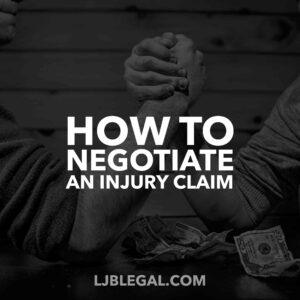
Negotiating your own personal injury settlement can feel overwhelming, especially when you’re recovering from an accident. Insurance companies often start with low offers, hoping you’ll accept less than you deserve. But with the right approach, you can push back and work toward a fair settlement. As a Louisiana personal injury lawyer, here’s my advice on how to negotiate a fair insurance settlement after a lowball offer.
Why Insurance Companies Start Low
Insurance adjusters are trained to minimize payouts. They know you’re dealing with medical bills, lost wages, and stress. Their initial offer may cover some immediate costs, but often overlooks future treatments, long-term effects, and pain and suffering. Accepting this first offer can leave you undercompensated. Here’s what you need to know before you agree to a settlement offer or sign an insurance settlement release.



We GET IT DONE
Clients trust us to handle their case properly and effectively
FREE Confidential Case Review (985) 240-9773Steps to Negotiate Effectively
1. Take Your Time
Don’t rush to respond. Review the offer carefully. Consider consulting with an attorney to understand the full value of your claim.
2. Respond in Writing
Politely reject the low offer in a written letter. Outline what’s missing, such as future medical expenses or lost wages. Provide evidence to support your points. Make a clear counteroffer based on the full extent of your damages.
3. Be Patient
Negotiation is a process. The insurance company may come back with another offer. Stay firm and don’t let frustration lead you to accept less than you deserve.


We DO THE RIGHT THING
The correct choice – always – is to do the right thing.
FREE Confidential Case Review (985) 240-9773Building a Strong Case
To support your counteroffer, gather the following:
- Medical Records: Include bills, doctor’s notes, and treatment plans. If ongoing treatment is needed, get a written statement from your doctor detailing future medical needs and costs.
- Proof of Lost Wages: Provide pay stubs, tax returns, or a letter from your employer confirming time off and lost income. If you’re self-employed, documentation may be more complex, and consulting an attorney can be beneficial.
- Impact on Daily Life: Keep a journal describing how your injuries affect your daily activities and emotional well-being. Statements from family, friends, or coworkers can also illustrate the impact.
- Liability Evidence: If fault is disputed, collect police reports, witness statements, photos, or videos that support your claim.


We ARE TRANSPARENT
We don’t play games and we don’t hide the ball.
FREE Confidential Case Review (985) 240-9773How Do I Settle a Personal Injury Claim With an Insurance Company?
Insurance companies are aware that individuals do not have the training or legal skills necessary to file a lawsuit and try a case to a successful conclusion. As a result, they will often offer a significantly lower amount of money to someone trying to negotiate their own claim. We have great advice about insurance adjuster tactics and what documentation you need to prove your case.
It is important to go into negotiations with the insurance company with an idea of what your case is worth.
But, before you accept any offer from the at-fault driver, you should consider a few things:
- Do you have actual, confirmed proof that the “policy limit” offer is actually for policy limits?
- Did the at-fault driver have any other insurance that may be able to pay for your damages? What other types of insurances may be available?
- Was the at-fault driver working at the time of the accident – even if in their own car?
- Does the at-fault driver have any other assets that can pay for your damages aside and apart from the insurance? Are you able to go after them if you agree to this offer?
- Will this settlement affect your ability to recover under your own under-insured motorist coverage?
- Is someone else potentially responsible for your damages? For example, what if both the driver and the actual car owner had separate insurance?
- What about your medical expenses? How do you pay those if the settlement is not enough to cover all the expenses? Can you negotiate those expenses?
- Do you know the true total of your medical expenses? Have you completed all treatment? Do you know the estimated lifetime cost of future care needed for your injury?
- Why is this insurance company in such a hurry to pay you? Insurance companies are not in the business of just giving money away – they like to make a nice profit to pay for their television ads.
- Or, why is the insurance drawing out negotiations? Are you nearing the statute of limitations? Are they waiting for the clock to run out?
You should make an informed decision about whether to accept the offer or not.
Your decision should only be made after you know all of the facts. Make sure you have all of the facts before agreeing to a settlement amount.


We ARE COMPASSIONATE
Emotionally intelligent listeners with positive attitudes.
FREE Confidential Case Review (985) 240-9773When to Consider Legal Help
While it’s possible to negotiate on your own, certain situations may warrant professional assistance:
- Severe or long-term injuries
- Disputed liability
- Complex cases involving multiple parties
An experienced Louisiana car accident attorney can handle negotiations, gather necessary evidence, and, if needed, take your case to court. They often work on a contingency basis, meaning you don’t pay unless they win your case.
Receiving a low settlement offer isn’t the end. It’s the beginning of negotiations. By understanding the tactics used by insurance companies and preparing a well-documented counteroffer, you can advocate for the compensation you deserve. If the process becomes too challenging, don’t hesitate to seek legal support to ensure your rights are protected.















